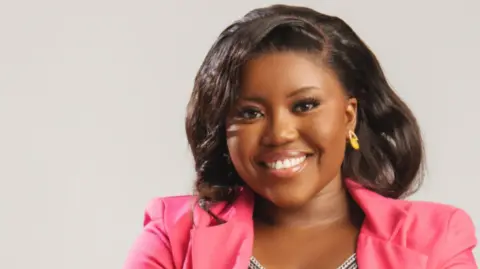Social media revamp by 92-year-old president struggles to woo young Cameroonians

Even before the world's oldest president confirmed that he would run for an eighth term in power, his social media accounts left experts in no doubt.
By the time 92-year-old Paul Biya officially confirmed he would seek re-election as Cameroon's president last week, he had already been ramping up his online presence for several months.
Daily posts on Facebook and X (formerly Twitter) mark a striking departure from his previous, occasional presence.
But Biya's attempts to win over young people ahead of October's election may be falling flat, analysts tell the BBC.
"Cameroon has over 5.4 million social media users, but 95% of young people rely on WhatsApp - a platform where presidential communication is nearly non-existent," says Rostant Tane, the director of Media Intelligence Sarl and author of the Cameroon 2024 Multimedia Audience Study.
"There's no regional segmentation, no interactivity, and very little effort to speak the digital language of young people," he adds.
Another stumbling block is authenticity.
"Many know that it is not Paul Biya himself who is writing - which creates distance and limits trust," says Hervé Tiwa, a lecturer in communication sciences.
"Their communication remains very top-down without any real interaction - comments ignored or deleted, a lack of personalised responses... This gives the impression of a strategy that is more cosmetic than participatory."
Why does this matter?
Cameroon's population is overwhelmingly young. Over 60% of the population is under 25, with more than half the electorate being under the age of 30, meaning they could potentially decide the outcome of the election.
"Political communication must serve democracy and transparency, and not just be used as a marketing tool," says 27-year-old communications specialist Ulrich Donfack.
Young people want to see concrete action on issues that affect them, agrees Falone Ngu, who is also 27.
"Cameroon's youth are not just looking for flashy graphics or slogans on the media! They want opportunities, change and hope," says the social enterprise founder, who did reserve some praise for the president's social media team for realising that "leadership and digitalisation go hand in hand".

Unemployment is high in Cameroon, with even the most qualified young people in possession of multiple university degrees struggling to find work. Corruption and security are also key concerns.
But instead of focusing on those issues, many posts on Biya's social media accounts emphasise his track record during 43 years in power - a time before much of the population was even born.
According to communication strategist Aristide Mabatto, Biya's team is now publishing excerpts in French and English from more than 300 speeches the president has delivered over the decades.
One recent, pointed example drew on a speech from 2000, chiding people who lecture others but fail to preach by example. That was posted just two days after one of Biya's longest-standing allies criticised his rule and abandoned him.
This somewhat staid approach does not appear to have ignited much enthusiasm, but is still an improvement on what went before.
"His communication used to be limited to official decrees and state addresses. The shift to frequent digital messaging shows a deliberate effort to reclaim the narrative and appear more present," argues Tiwa.
Biya's absence from the public for more than six weeks last year had led to speculation about his wellbeing and unfounded rumours that he had died.
Supporters have praised these latest efforts, with state media like Cameroon Tribune highlighting Biya's digital outreach as a sign of vitality and leadership.
But scepticism and sarcasm are in greater evidence online. Comments below recent posts on Paul Biya's X and Facebook accounts include:
"It looks like he's discovering the internet in 2025, but it's primarily an electoral market test," says a user called Cynthia.
"Finally he's talking to young people!", comments Jean-Pierre.
"Cameroonians want roads, not hashtags," writes a user called Mireille.
"Personally, I'm not at all convinced," 32-year-old entrepreneur Che Arnold tells the BBC of the Biya camp's strategy to appeal to young voters.
"It needs to go beyond tweets, Facebook messages and a simple online presence to promote political reforms but also solve real social problems."
Biya will have to wait until the election in October to see if these efforts will translate into more young people voting for him.
BBC





